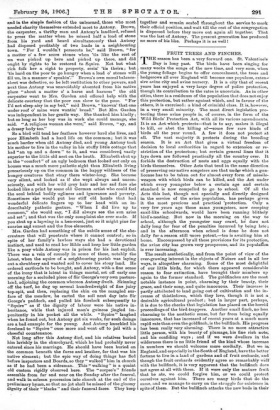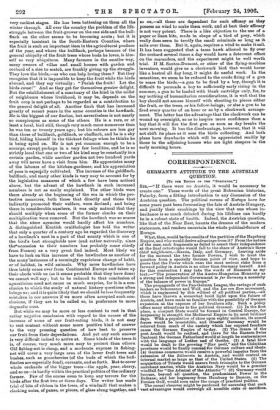FRUIT TREES AND FINCHES.
THE season has been a very forward one. St. Valentine's Day is long past. The birds have been singing for many weeks the songs of the new time, and very soon, when the young foliage begins to offer concealment, the trees and hedgerows all over England will become one populous, exten-Y sive avine city and avine nursery. It is a city that of recent years has enjoyed a very large degree of police protection, though its contribution to the rates is uncertain. As in other cities, there is a residuum of the population that does not enjoy this protection, but rather against which, and in favour of the others, it is exercised: a kind of criminal class. It is, however, in a very small minority. The most direct legislation pro- tecting these avine people is, of course, in the form of the Wild Birds' Protection Act, with all its various amendments. It is an Act which protects—that is to say, makes it illegal to kill, or abet the killing of—some few rare kinds of birds all the year round. A few it does not protect at all. The vast majority it protects during the breeding season. It is an Act that gives a virtual freedom of decision to local authorities in regard to extension or re- striction of the protection; but certain general lines that it lays down are followed practically all the country over. It forbids the destruction of nests and eggs equally with the birds themselves. Other Acts that tend in the same direction of preserving our native songsters are that under which a gun- license has to be taken out for almost every form of missile- weapon with which birds can be killed, and the Act under which every youngster below a certain age and certain standard is now compelled to go to school. Of all the Acts this last, though not specially and directly designed in the service of the avine population, has perhaps given it the most precious and practical 'protection. Only a very few years ago these same youagsters, now creeping snail-like schoolwards, would have been running blithely bird's-nesting. But now in the morning on the way to school, although the youngster may crawl, he dare not daily long for fear of the penalties incurred by being late ; and in the afternoon when school is done he does not dally for a reason still 'more potent,—tea is awaiting him at home. Encompassed by all these provisions for its protection, the ovine city has grown very prosperous, and its population is ever increasing.
The result aesthetically, and from the point of view of the ever-growing interest in the objects of Nature and in all her ways, is altogether charming. Some of the most delightful of our little birds, for which there appeared considerable reason to fear extinction, have brought their numbers up again to the former standard. The goldfinches are the most notable instance in point, charming by their beauty, their grace, and their song, and quite innocuous. Their increase is partly attributed to land going out of cultivation and the in- crease of thistledown, which they love, though it is not a, desirable agricultural product; but in larger part, perhaps, it is due to the checks that legislation has placed on the horrid proceedings of the bird-trappers. Another small finch, no leas charming to the aesthetic sense, but far from being equally innocuous, that has increased of recent years at a much more rapid rate than even the goldfinch, is the bullfinch. His progress has been really very alarming. There is no more attractive little person, with his beauty of plumage, his fine rich note; and his confiding ways ; and if we were dwellers in the wilderness there is no little friend of the kind whose increase in numbers we should welcome more cordially. But we in. England, and especially in the South of England, have the better' fortune to live in a land of gardens and of fruit orchards; and' though the fruit orchards evidently agree so remarkably well with the bullfinch, it is very apparent that the bullfinch does not agree at all with them. If it were only the mature fruit that he ate, we could forgive him, or we could protect ourselves against him. There are many birds that do the same, and we manage to carry on the struggle for existence in spite of them. But the bullfinch attacks the new buds in their
very earliest stages. He has been battening on them all the winter through. All over the country the problem of the life- struggle between the fruit-grower on the one side and the bull- finch on the other seems to be becoming acute ; but it is especially insistent in the South-Eastern Counties, where the fruit is such an important item in the agricultural produce of the year, and where the bullfinch, perhaps because of the general ubiquity of the fruit trees whose buds he loves, is him- self so very ubiquitous. Many farmers in the smaller way, many owners of villas and small houses with garden and orchard of a size to match, are frankly giving up the struggle. They love the birds,—as who can help loving them ? But they recognise that it is impossible to keep the fruit while the birds abound, and they say virtually : "Perish the fruit ! Let the birds come!" And so they get for themselves greater delight. But the establishment of a sanctuary of the kind in the midst of neighbours whose livelihood, it may be, depends on the fruit crop is not perhaps to be regarded as a contribution to the general delight of all. Another finch that has increased greatly of recent years in the same counties is the hawfinch. He is the biggest of our finches, but nevertheless is not nearly so conspicuous as some of the others. He is a rare, or at least a local, bird still, though very much more numerous than he was ten or twenty years ago ; but his colours are less gay than those of bullfinch, goldfinch, or chaffinch, and he is a shy bird, hiding himself in the thickest foliage when he thinks he is being spied on. He is not yet common enough to be a scourge, except perhaps in a very few localities, and he is so strictly local that one or two of his kind may be constantly in a certain garden, while another garden not two hundred yards away will never have a visit from him. He appreciates many of the labours of the kitchen-gardener, and his appreciation of peas is especially cultivated. The increase of the goldfinch, bullfinch, and many other kinds is very easy to account for by the legislative measures of which a few have been noticed above, but the advent of the hawfinch in such increased numbers is not as easily explained. The other birds were there already at the beginning of the era in which the pro- tective measures, both those that directly and those that indirectly promoted their welfare, were devised; and being there in considerable numbers, it was only natural that they should multiply when some of the former checks on their multiplication were removed. But the hawfinch was so scarce that the. eine agencies would hardly affect his numbers. A distinguished Kentish ornithologist has told the writer that only a quarter of a century ago he regarded the discovery of a hawfinch's nest in a part of that county which is one of the bird's best strongholds now (and rather naturally, since theaccession to their numbers has probably come chiefly from France) as a very great find indeed. Most likely we have to look on this increase of the hawfinches as another of the many'instances of a seemingly capricious change of habit, or of habitat, in wild animals. Why more ha.wfluches have thus lately come over from Continental Europe and taken up their abode•with us (as it seems probable that they have done) we cannot well say ; but to be reduced to that conclusion of agnosticism need not cause us much surprise, for it is a con- clusion to which the study of natural history questions often brings us ; and it is quite likely that we should be less frequently mistaken in our answers if we more often accepted such con- clusions, if they are to be called so, in preference to more dogmatic ones.
But while we may be more or less content to rest in that rather negative conclusion with regard to the causes of the increase of some of our fruit-eating birds, it is not easy to rest content without some more positive kind of answer to the very pressing question of how best to preserve our fruit from their depredations. And yet any such answer is very difficult indeed to arrive at. Some kinds of the trees it is, of course, very much more easy to protect than others. Old fishing-net is cheap, and a moderate expense in fishing. net will cover a very large area of the lower fruit trees and bushes, such as gooseberries (of the buds of which the bull- finches are especially fond), currants, and so forth. But to cover whole orchards of the bigger trees—the apple, pear, cherry, and so on—is hardly within the practical politics of the ordinary farmer. Few of the scares seem to keep any terrors for the birds after the first two or three days. The writer has made trial of bits of ribbon in the trees, of a windmill that makes a clacking noise, of panes, or pieces, of glass slung together, and so on,—all these are dependent for such efficacy as they possess on wind to make them work, and at best their efficacy is not very potent. There is a like objection to the use of a paper or linen kite, made in shape of a bird of prey, which really does seem to terrify the small criminals so long as it sails over them. But it, again, requires a wind to make it sail. It has been suggested that a tame hawk allowed to fly over the orchard several times a day would have a deterrent effect on the marauders, and the experiment might be well worth trial. If M. Santos-Dumont, or other of the flying-machine inventors, would give us a clockwork bird that would hover like a kestrel all day long, it might do useful work. In the meantime, we seem to be reduced to the crude firing of a gun to scare the birds,—a gun to be fired by a boy, though it is difficult to persuade a boy to sufficiently early rising in the summer, a gun to be loaded with blank cartridge only, for, to say nothing of humanitarian considerations, it is well that the boy should not amuse himself with shooting to pieces either the fruit, or the trees, or his fellow-beings; or else a gun to be fired every quarter of an hour or so by a clockwork arrange- ment. The latter has the advantage that the clockwork can be wound up overnight, so as to inspire more confidence than a boy that it will fire the first gun as soon as day breaks the next morning. It has the disadvantage, however, that it will not shift its place as it sees the birds collecting. And both plans have drawbacks which will be appreciated readily by those in the adjoining houses who are light sleepers in the early morning hours.











































 Previous page
Previous page